FILMED BY DE PALMA, FIORE, RUBIN IN 1968, RELEASED MARCH 22, 1970 IN NYC
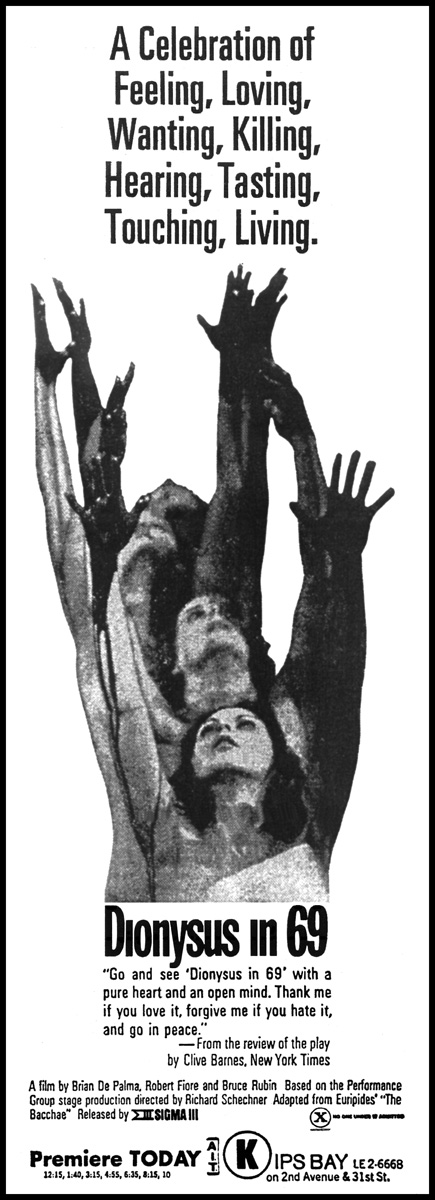 50 years ago today, Dionysus In '69 had its premiere at Kips Bay Theater in New York. Credited alphabetically as a film by Brian De Palma, Robert Fiore, and Bruce Rubin, it's a split-screen document of Richard Schechner's avant-garde play of the same name, which Schechner based on Euripides The Bacchae. Dionysus In '69 was staged in a New York City garage by Schechner's Performance Group as a work of in-the-round environmental theatre. Feeling strongly that it was an important work that "should be preserved on some level," De Palma approached Schechner and The Group about filming it, and they all liked the idea. De Palma put up a lot of his own money from savings, and with Fiore and Rubin (the latter recording the sound), filmed two performances in June and July of 1968.
50 years ago today, Dionysus In '69 had its premiere at Kips Bay Theater in New York. Credited alphabetically as a film by Brian De Palma, Robert Fiore, and Bruce Rubin, it's a split-screen document of Richard Schechner's avant-garde play of the same name, which Schechner based on Euripides The Bacchae. Dionysus In '69 was staged in a New York City garage by Schechner's Performance Group as a work of in-the-round environmental theatre. Feeling strongly that it was an important work that "should be preserved on some level," De Palma approached Schechner and The Group about filming it, and they all liked the idea. De Palma put up a lot of his own money from savings, and with Fiore and Rubin (the latter recording the sound), filmed two performances in June and July of 1968."I was very strongly affected by the play when I saw it," De Palma told Cinefantastique's David Bartholomew in 1975. "Bill Finley had been playing Dionysus with The Group for some time. I came to see him and said, 'God, this is incredible,' environmental theatre, the way it affects the audience and draws them into the piece itself. This was the most exciting thing I'd seen on stage in years. So I began to try and figure out a way to capture it on film. I came up with the idea of split-screen, to be able to show the actual audience involvement, to trace the life of the audience and that of the play as they merge in and out of each other. I wanted to get the very stylized dramatic life of the play juxtaposed to what was really going down in that room at that time. I was floored by the emotional power of it. I shot one of the cameras and Bob Fiore the other. The editing took about a year, because I wanted to play with the different ways to use split-screen. I learned a lot and also about the kind of documentary realism that I would use later in Hi, Mom! and even in Phantom Of The Paradise."
Rubin talked about Dionysus In '69 in Justin Humphreys' book Interviews Too Shocking To Print! (2014)...
Brian called me and said, 'You've got to go see this play, Dionysus In '69,' which Richard Schechner had done down at the Performing Garage. I'd heard about it and I'd heard that Bill was in it and I found that really kind of fascinating because I heard that people kind of took their clothes off... And I went, 'That's not Bill! Bill's not going to take his clothes off in front of people!' The Bill Finley I knew was modest beyond belief and Brian kept saying, 'He's changed. He's really changed.' I was really more intrigued by that than anything else, that Bill would have changed so much. Not only did he take his clothes off, but he was buff... This guy never exercised, I thought, in his entire life, but he had turned everything around. And I think the transformation from the Bill Finley I knew prior to Dionysus and the Performance Garage to the Schechner years was one of the most profound transformations of any person I've ever known. He just became a different person: He was self-possessed in a way that I had never seen before; he was mature in a whole new way; his childlike sensibility was still there, but it had been grafted onto a person who had become really articulate, knowledgeable-- an incredible performer, audacious and daring in front of people, and bigger than life. The change was unbelievable to me. I had never witnessed that. I don't knwo if he and I ever talked about it-- I can't remember sitting down and having a conversation about it but I know we all sat and talked because we decided that we wanted to make a movie. Brian thought this would be great. Fiore would be another cameraman, I would be the sound man and editor, which was the way we looked at it. And we were going to do this idea that Brian had, which has become a signature for all of his films, which is a double-screen [split-screen], because Brian is a total voyeur, absolute voyeur, to this day, and he wanted the camera watching all the stuff that was goiong on away from the main stage-- the seductions that were going on. He really got off on it.Bill was the one who kind of brought us all in to Schechner, and Schechner, of course, loved the idea of this preservation of a piece of work that he did. Most plays are never preserved and for him that was really remarkable. And Brian had a little bit of notoriety and Bill had the notoriety of Woton... The film, once it got made, Brian really got it to a big distributor-- a group called Sigma 3-- it was a small part of a much bigger company, sort of the art wing.
The day after the film premiered at Kips Bay Theater, the New York Times ran a review by Roger Greenspun:
RICHARD SCHECHNER'S "Dionysus in 69" played during 1968 and 1969 in a converted garage on Wooster Street. Brian De Palma made his movie version in the course of just two actual performances. It opened yesterday at the Kips Bay Theater.Although rough in a few technical details, it is a film of extraordinary grace and power. With exceptional imagination and intelligence, De Palma has managed both to preserve the complex immediacies of Schechner's dramatic event (based on "The Bacchae" of Euripides) and to work those immediacies into the passionate and formal properties of his own creation.
Schechner approached "The Bacchae" not so much to re-interpret the play as to re-experience some of the impulses surrounding and informing it—to which end Euripides's lines were sometimes useful, and sometimes not. Schechner's troupe, the Performance Group, would by turns chant, or dance, make love, plot murder, whisper to the audience, or among themselves hold group therapy sessions.
With its nudity (partial in the actual production I saw; total in the film), its audience-participation orgies (timid and embarrassing in the production; sensual and enthusiastic in the film) and its range of theatrical invention, "Dionysus in 69" strives for a degree of sensuous presence that, paradoxically, I think it best achieves as filtered through the film.
De Palma uses a split screen, and he uses it in a variety of ways. Both sides of the screen always record the same moment in the production. But sometimes they will show different parts of the arena (the Performing Garage was a kind of multi-level theater in the round, with cast and audience often sharing spaces). Sometimes they will develop different points of view toward a single action. Sometimes they will place an apparently random event in formal perspective, and at the same time isolate important detail.
The sequences in which the chorus of Bacchantes in effect give birth to Pentheus (William Shephard) and Dionysus (William Finley, in a fine performance) is so treated, and it makes a kind of patterned energetic sense on film that it did not, for me, make in production.
And yet the film is a record of the production, slightly cut (the group therapy, blessedly, is gone), and not an attempt to extend the boundaries of theater through "cinema." Partly for this reason it is exciting as a movie, approaching its material with great brilliance and ingenuity, but never trying to supersede the material.
Between the two principal personalities involved (I'll except Euripides, who really deserves most of the credit—but in a different kind of review) a mutually enriching tension seems to exist. For if Richard Schechner's power looks the greater for being framed within Brian De Palma's cameras, so De Palma, a witty, elegant, understated young director (for example, "Greetings") seems to have found new ease and vigor and a taste for risks in meeting the challenge of this film.
The Cast
DIONYSUS IN 69, a film by Brian De Palma, Robert Flore and Bruce Rubin; directed for the stage by Richard Schechner; portions of the text adapted from "The Bacchae" of Euripides as translated by William Arrowsmith; released by Sigma III. At the Kips Bay Theater, Second Avenue and 31st Street. Running time: 86 minutes. (The Motion Picture Association of America's Production Code and Rating Administration classifies this film: X—no one under 17 admitted.)
Members of the performance group taking part in this film are: Remi Barclay, Samuel Blazer, John Bosseau, Richard Dic, William Finley, Joan MacIntosh, Vicki May, Patrick McDermott, Margaret Ryan, Richard Schechner, William Shephard and Ciel Smith.
Updated: Saturday, March 28, 2020 8:43 AM CDT
Post Comment | Permalink | Share This Post




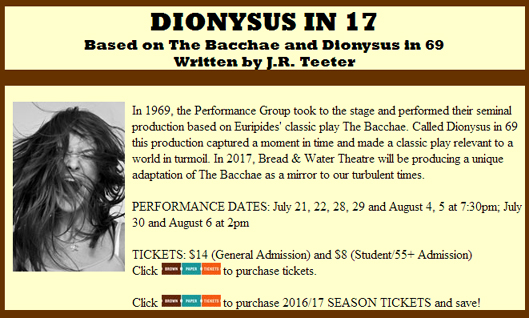
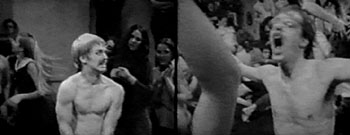
 Dionysus In '69 was the first film ever screened at Zeitgeist Multi-Disciplinary Arts Center, and now it will be included in next week's six-day program, celebrating Zeitgeist's 30th anniversary. Brian De Palma's split-screen documentary, filmed with Robert Fiore and Bruce Rubin, will screen at 5:30 pm on Tuesday, November 29th. The description of the screening at the
Dionysus In '69 was the first film ever screened at Zeitgeist Multi-Disciplinary Arts Center, and now it will be included in next week's six-day program, celebrating Zeitgeist's 30th anniversary. Brian De Palma's split-screen documentary, filmed with Robert Fiore and Bruce Rubin, will screen at 5:30 pm on Tuesday, November 29th. The description of the screening at the 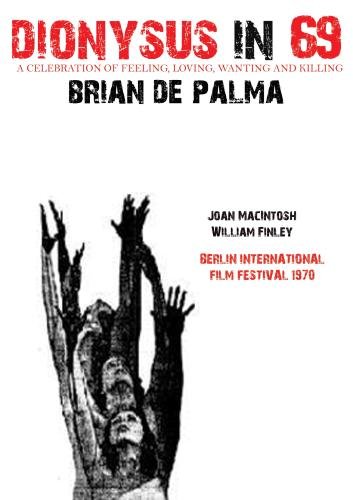 Today at
Today at 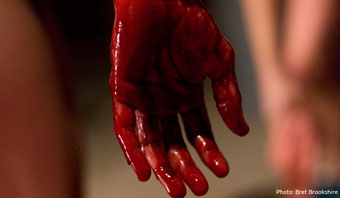
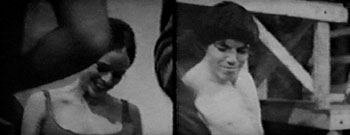

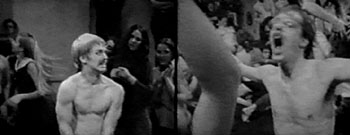 Another early Brian De Palma documentary is getting attention this week, this time at the
Another early Brian De Palma documentary is getting attention this week, this time at the